Get smooth and private web browsing with Avast Secure Browser for iPhone and iPad
- Security
- Privacy
- Performance
Web browsers are our gateway to the internet, where we can do just about anything, from surfing the web to ordering products to video-chatting with friends and family. But just like a physical gate, unless your browser is secure, it may be vulnerable, leaving your personal information exposed. Learn why some of the most popular web browsers aren’t necessarily the safest and how a specialized secure browser will protect your privacy the most.
/The-best-browsers-for-security-and-privacy-Hero.jpg?width=1200&name=The-best-browsers-for-security-and-privacy-Hero.jpg)
The best browser for protecting your privacy is a dedicated secure browser like Brave, Tor, or Avast Secure Browser. These private browsers offer significantly stronger built-in security and privacy features than popular web browsers like Google Chrome or Microsoft Edge.

This Article Contains:
Here’s a rundown of the best private browsers specifically designed with privacy and security at the forefront. Learn how they keep your private information safe and how their security features compare with the other web browsers on our list.
Built on top of Chromium, Google’s open-source software platform, Avast Secure Browser rivals the leading browsers in terms of speed and efficiency. But unlike less secure browsers, Avast Secure Browser comes with an array of security and privacy tools built right in, making it a strong contender for the best browser for privacy and security.
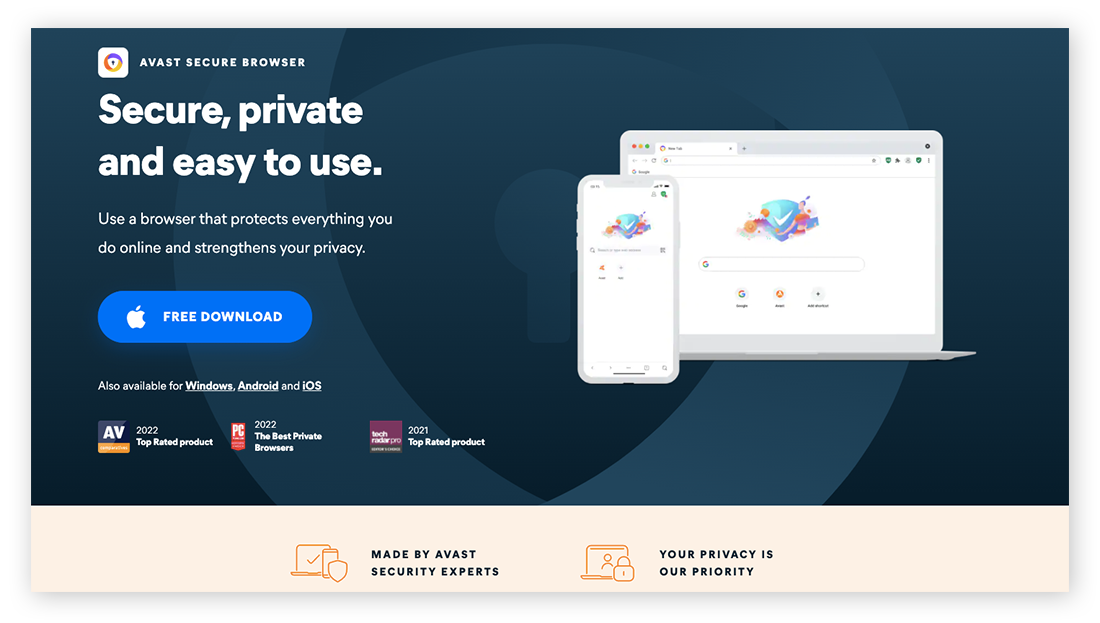
The built-in ad-blocker is extremely effective, and it’s customizable while working across all platforms.
Anti-phishing detection alerts you immediately if malicious websites are trying to steal your data or infect your device with malware.
Anti-tracking features prevent websites and advertisers from identifying you through cookies or other web-tracking methods.
Anti-fingerprinting technology ensures that your unique device ID and browser profile isn’t accurately captured.
Limited features beyond privacy and security tools, although compatibility with Chrome means you can add your favorite Chrome extensions.
Avast Secure Browser was engineered from the ground up with privacy and security in mind, and it includes advanced features such as Bank Mode to protect your sensitive financial information. You’ll even be notified immediately if any of your data is compromised or has been exposed in a data breach.
Avast Secure Browser also encrypts your data with automatic HTTPS protection, even for websites that don’t offer it. Start using Avast Secure Browser today, completely free, and enjoy the peace of mind of a properly secure browser.
Brave is an open-source web browser also built on Google’s Chromium platform. By default, the browser blocks ads, cookies, and other trackers, and disguises your device against browser fingerprinting. You can customize security and privacy settings for specific websites, and Brave features an integrated Tor mode.
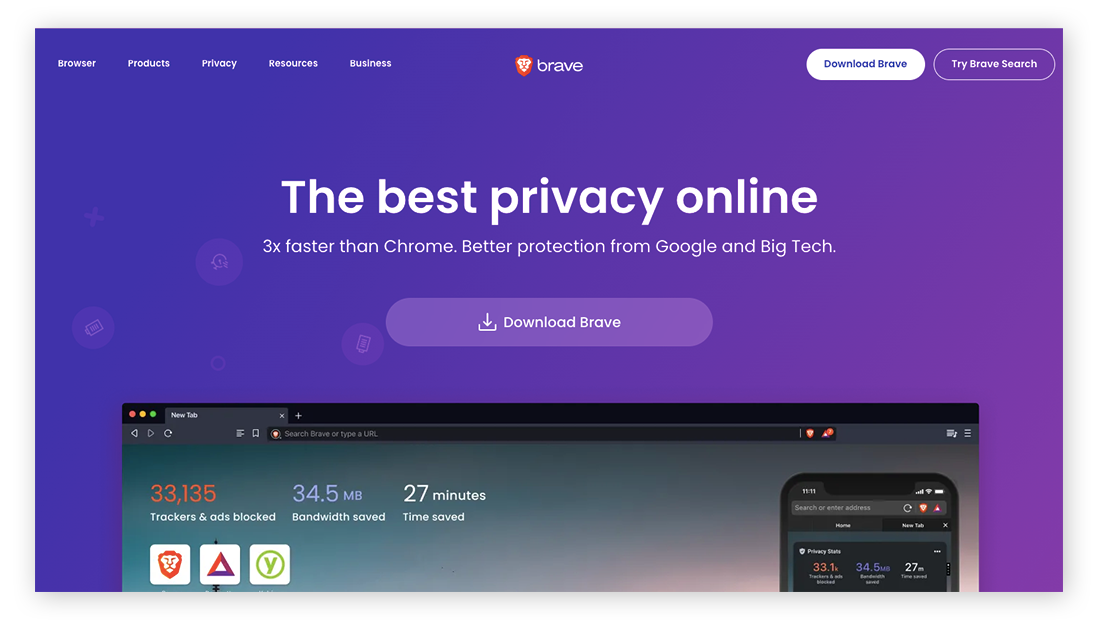
A suite of privacy features including ad blockers and anti-tracking technology.
Integrated password manager and HTTPS encryption tools.
The optional Brave Rewards system allows users to accept (non-targeted) ads while browsing in exchange for supporting their favorite websites.
Fewer extensions than many of its competitors.
Awkward interaction with some websites, which muddies the web browsing experience.
Brave combines all the most important privacy and security features and default settings, making it one of the most secure browsers available. Although some aspects of its user experience are wanting, Brave’s ability to block browser fingerprinting and stop snoops is laudable.
Google Chrome has been the most popular browser for years. Reliable and convenient, especially for people with Google accounts, Chrome is easy to set up as your default browser, while offering easy integration with other Google products and services. But Chrome lacks many of the security features directly built in to dedicated private browsers. So, for more security, you’ll have to add extensions — and some browser extensions are not as safe as they claim to be.
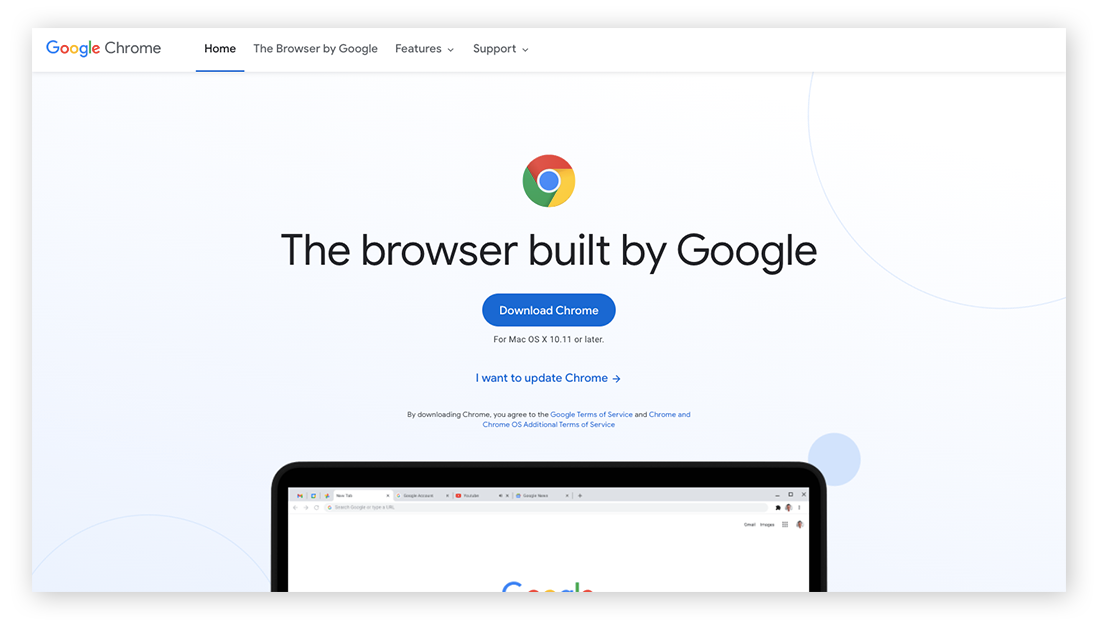
Frequent updates make it difficult for hackers to keep up with the company’s advancements.
Default safe-browsing protections keep some dangerous websites and phishing attacks at bay.
Google pioneered practices like online tracking, targeted advertising, and mass data collection.
For more robust protection, you need to agree to send Google your browsing data.
Third-party cookies are permitted by default, and there’s no built-in ad blocking protection.
While Chrome may be convenient, it isn’t the best browser for security and privacy. If you have a Google account, you’re automatically signed in on Chrome, linking all your browsing activity with your Google account. This is convenient, but it gives Google even more data to use for targeted advertising and other purposes.
You can take back some of your privacy by changing the settings in both Chrome and your Google account, and by adding safe and secure browser extensions. But if privacy is your primary concern, you should switch to a more secure web browser.
Microsoft Edge has replaced Internet Explorer as the default browser on Windows devices. Edge currently runs on Chromium, the same browser kit developed by Google that powers Chrome and other browsers.
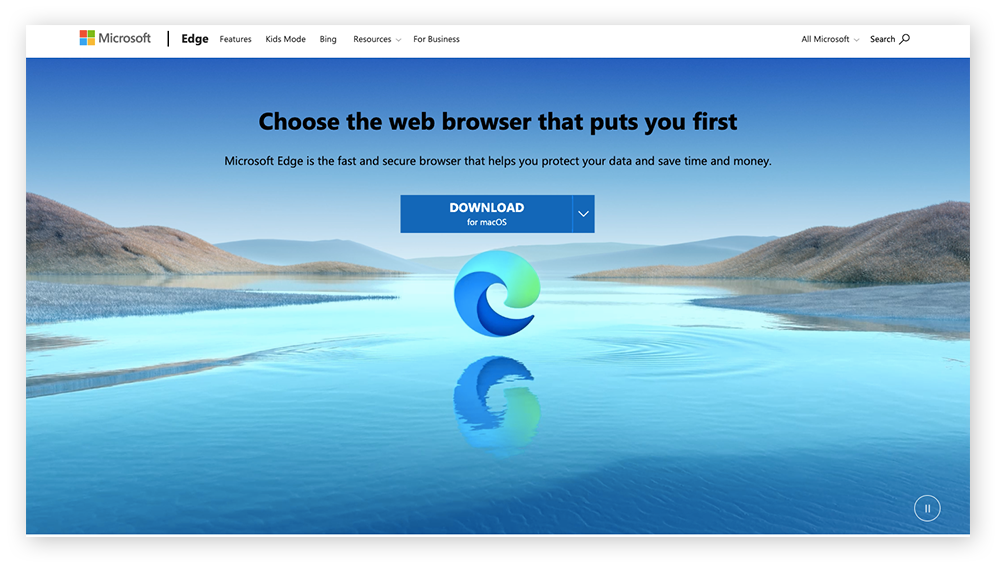
Weekly automatic software updates help Microsoft Edge stay on top of security issues.
Integrated tracking protection helps safeguard your privacy online and shield you against third-party advertisers.
Edge may send device data to Microsoft, which may use it for advertising or other purposes.
Lacks the comprehensive security infrastructure of dedicated secure browsers.
Thanks to anti-tracking technology and regular updates to help combat zero-day attacks and other threats, Microsoft Edge is a far safer browser than its predecessor, Internet Explorer. But given the relative dearth of security features — and ongoing questions about how Microsoft handles user data — Edge still doesn’t rank among the best browsers for privacy.
Mozilla, the maker of Firefox, has long advocated for more privacy, security, and transparency. Firefox browser, as an open-source web browser, has always been free for anyone to inspect, which has helped make it one of the more secure browsers around. While Firefox’s user base has declined recently, it remains one of the most popular third-party browsers.
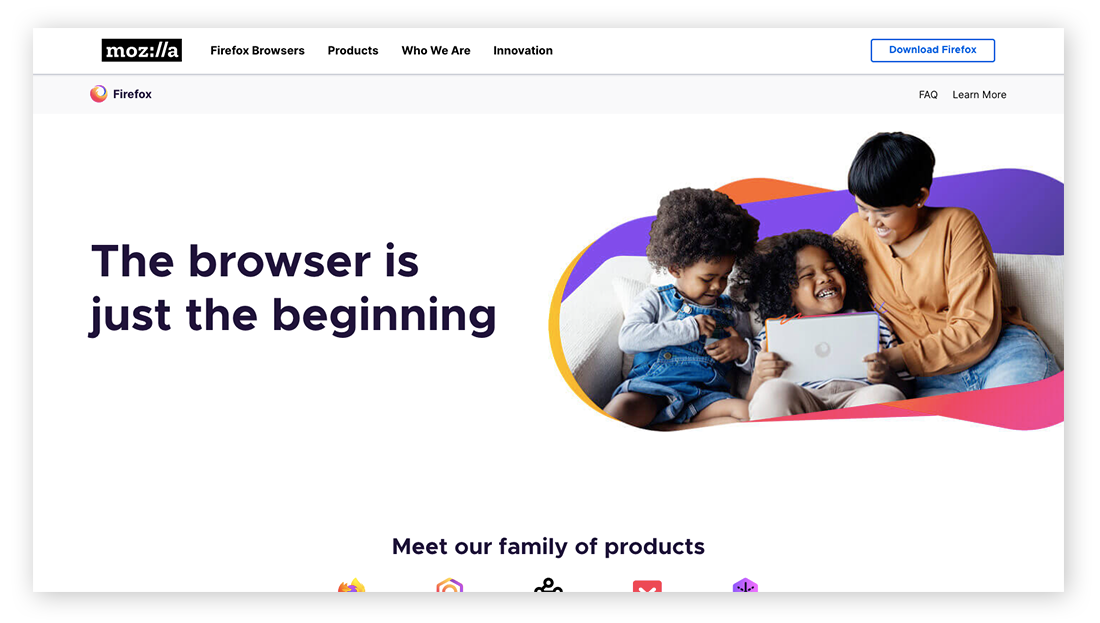
Firefox is a safe browser for privacy, even if it lacks some of the more advanced security tools.
Customizable privacy settings, such as protections against tracking and browser fingerprinting.
You’ll need to manually adjust your settings for stronger protection.
Firefox still tracks you, unless you block its ability to send data back to Mozilla.
You’ll have to install third-party extensions for more robust features like HTTPS encryption and ad blocking.
Compared to other popular browsers like Chrome, Firefox has stronger security features. Thanks in part to its open-source software base, Firefox issues frequent security updates to improve performance and help foil hackers and other cybercriminals. But for more advanced privacy protection, you’ll need a secure browser built with security as the primary concern.
While never the most popular browser, Opera has been in the browser game for a while. In fact, Opera pioneered many of the features we now take for granted, such as browser tabs. Opera was also the first browser to introduce built-in pop-up blocking — another feature we’d be hard-pressed to live without today.
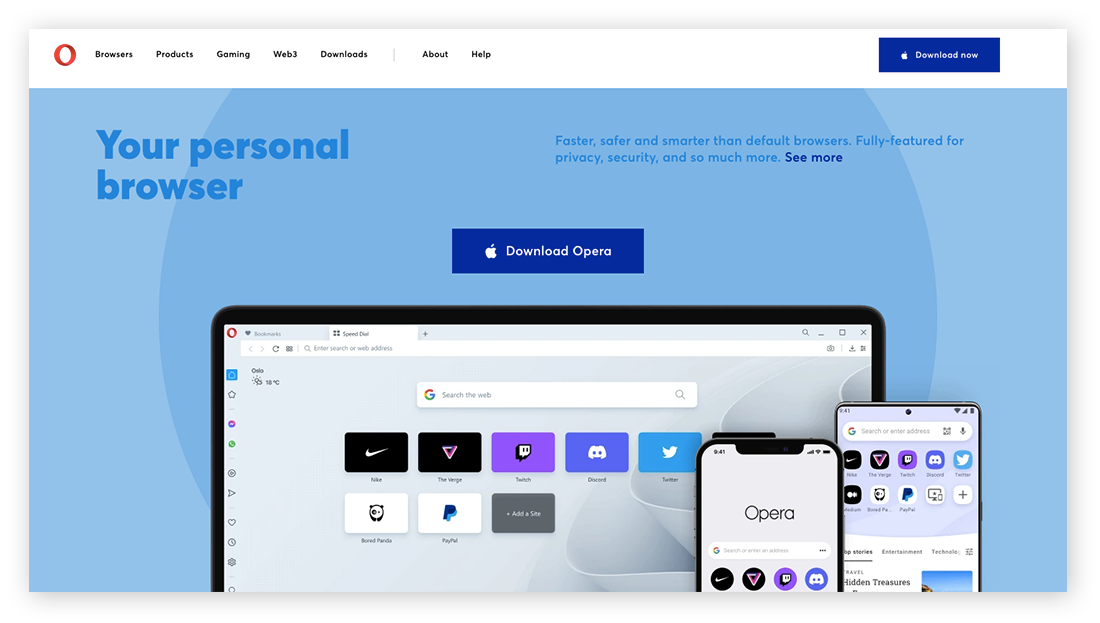
A browser security suite that includes several tools to help protect you online, like an integrated proxy that can hide your IP address.
Built-in ad blocking, and a database of malicious websites that are flagged before you visit them.
Your data may be collected by Opera to help profile your device and activity.
The integrated proxy is not as secure as a VPN.
Although not a dedicated secure browser, the features outlined above make Opera one of the safest browsers out there. And with a track record of innovation in both privacy and user experience, Opera is one of the best alternatives to the other more popular — but less secure — browsers.
Thanks to the widespread adoption of mobile web browsing, Apple’s Safari browser now has the second-largest browser market share worldwide. Safari uses Google’s Safe Browsing lists to ensure that you stay away from malicious sites. But this means you have to send your browsing data to Google. So if you’re using Safari instead of Chrome, you could still be tracked by Google.
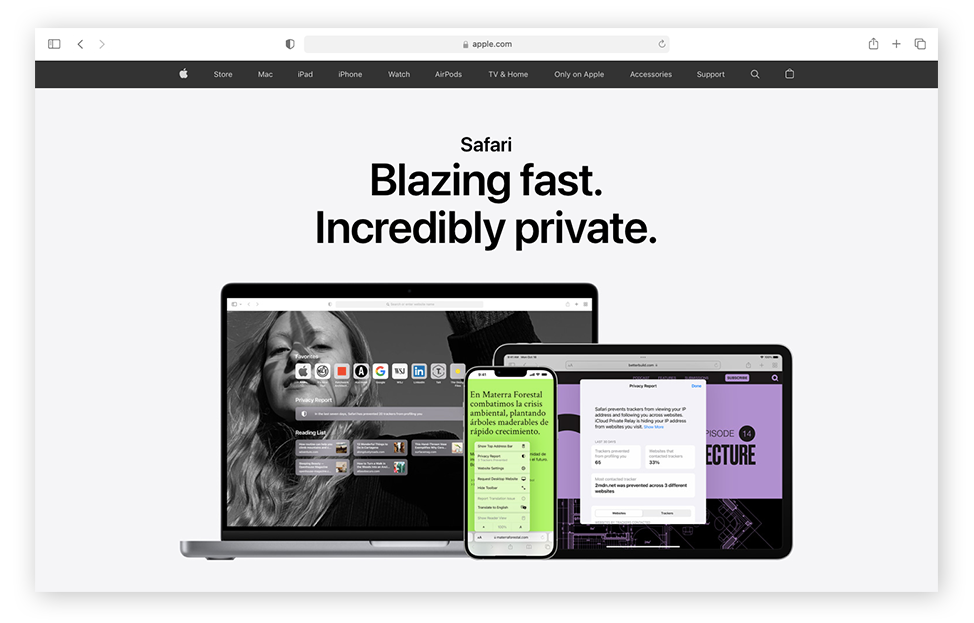
The built-in password-management feature generates new passwords for you and stores them in your iCloud Keychain.
Security features including malicious site blocking and automatic anti-tracking protocols.
No built-in ad blocking software, so if you’re looking for an ad blocker for your iPhone, you’ll need a third-party browser extension.
Safari is only compatible with Apple devices.
Safari is a more secure web browser than Chrome. Third-party ad tracking cookies are blocked by default, and Safari also prevents cross-site tracking, in which advertisers follow you from one page to another to learn more about your behavior and preferences.
Built to access the Tor network — a system of proxy servers that encrypt and redirect traffic to conceal your online identity — Tor Browser prioritizes privacy above all else. That makes it one of the most secure browsers around, but it comes at the expense of usability and convenience.
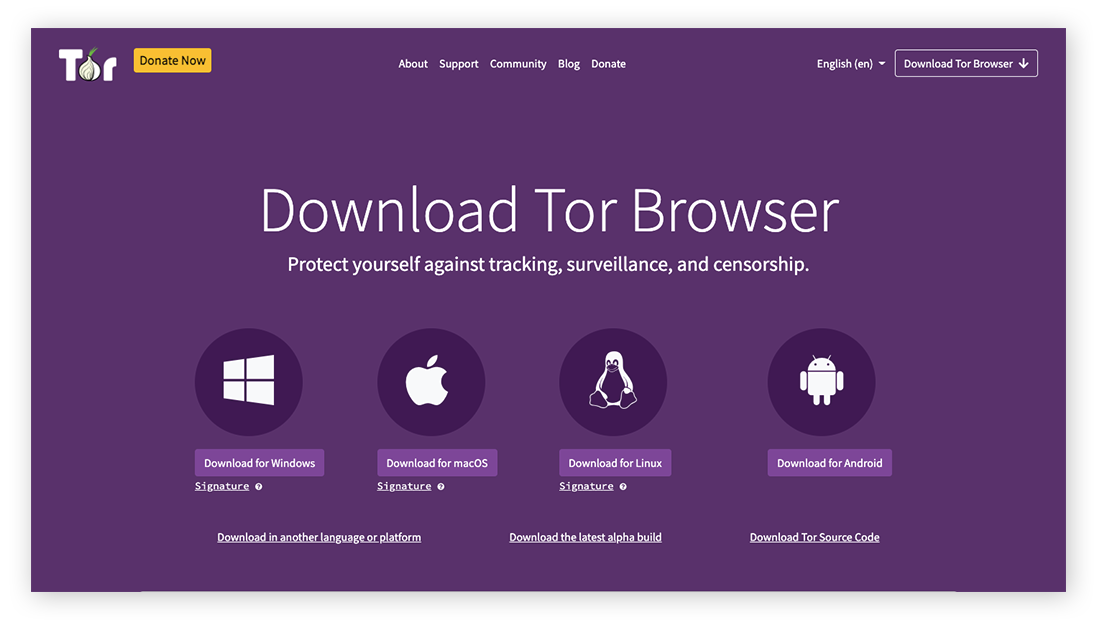
Hides your identity while you browse the Tor network, which already comes with several layers of encryption.
Doesn’t store your browsing history, deletes cookies after each browsing session, and blocks browser fingerprinting.
Features extensions that reinforce privacy and security, including automatic HTTPS encryption.
Features are finely tuned, so additional extensions or settings adjustments can compromise your security.
You may find Tor Browser too slow for everyday use, because of the Tor network’s complex process of encrypting and redirecting traffic through proxy servers.
While Tor Browser’s privacy protections are formidable, even the most secure fortress has weak points. It’s still possible for your usernames and passwords to leak, and other people may still be able to monitor you through your ISP or home Wi-Fi network.
Unless you set up a VPN and connect through that first, your ISP will be able to see that you’re using Tor. And since many ISPs and governments view Tor simply as a means to access the dark web, you might have even more difficulties later on.
Vivaldi is an offspring of the Opera browser, and combines the core features of its parent with extreme customizability, allowing users to fine-tune the browser to meet their needs. Features you’d normally need to download as extensions come baked-in, and Vivaldi has a much smaller data collection footprint than many of its competitors.
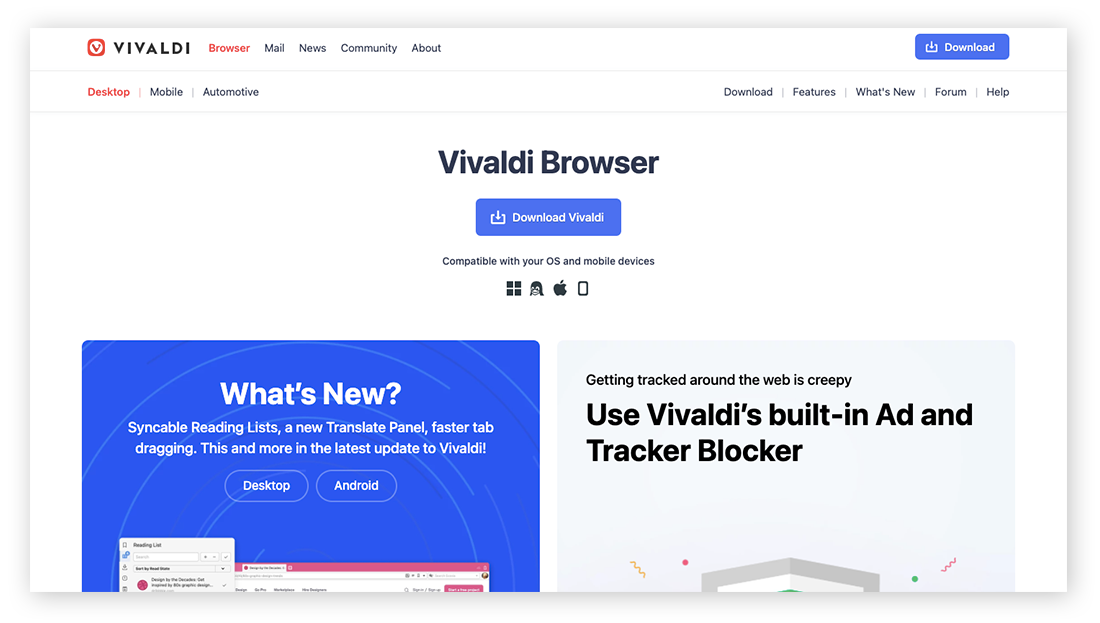
Minimal collection of user data, and it’s not sold to third parties.
No need to install additional extensions, which could compromise your privacy.
The same security features missing in Opera are also not included in Vivaldi.
Not available for iOS.
Vivaldi is a perfectly safe browser to install and use on your PC, Mac, Linux, or Android device. While it’s not a significant security upgrade over its parent browser, Opera, it’s certainly a better browser for privacy than more popular options like Google Chrome.
For ultra-safe browsing use Avast Secure Browser, Brave, or Tor. These private browsers offer a full-range of security features, including automatic encryption, ad blocking, anti-tracking, and alerts for unsafe websites.
While all browsers have features that keep your information safe and private, some browsers are more secure than others. The most secure browsers also work well on mobile devices, so you can surf the web privately regardless of what kind of device you’re on.
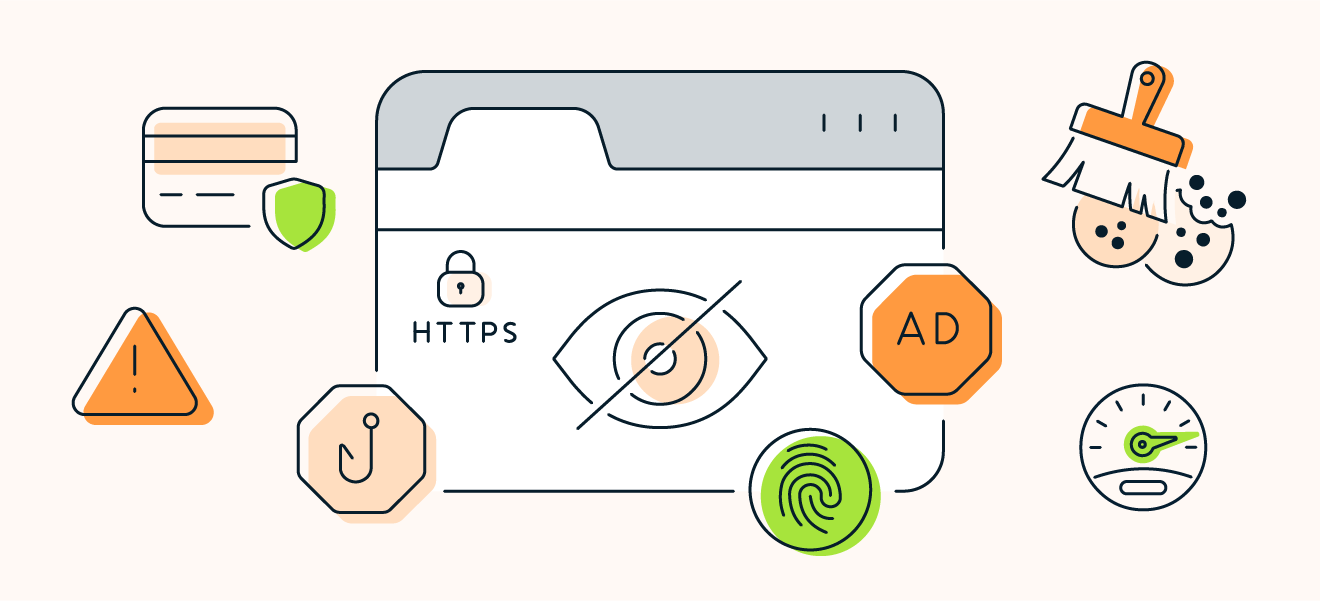 Secure browsers include built-in features like anti-tracking and anti-fingerprinting protection.
Secure browsers include built-in features like anti-tracking and anti-fingerprinting protection.
If you’re using any of the leading web browsers, you’re almost certainly being tracked. Browser tracking lets websites and companies follow your online activity and gather insights into your preferences. But there are private browsers that don’t track you.
The leading browsers have earned their status largely because they’re convenient, clean, and an offer fast web browsing speeds. These features keep people coming back to the same browsers again and again.
But the leading browsers are also owned by some of the largest tech companies around — Apple, Google, and Microsoft, especially — and these companies don’t prioritize data privacy and security.
In fact, web tracking happens on all the leading web browsers, and advertisers track every site you visit, using browser fingerprinting and other techniques to gather insights and target you with ads.
But because the leading browsers are so well-known, they can be vulnerable to threats like browser hijacking.
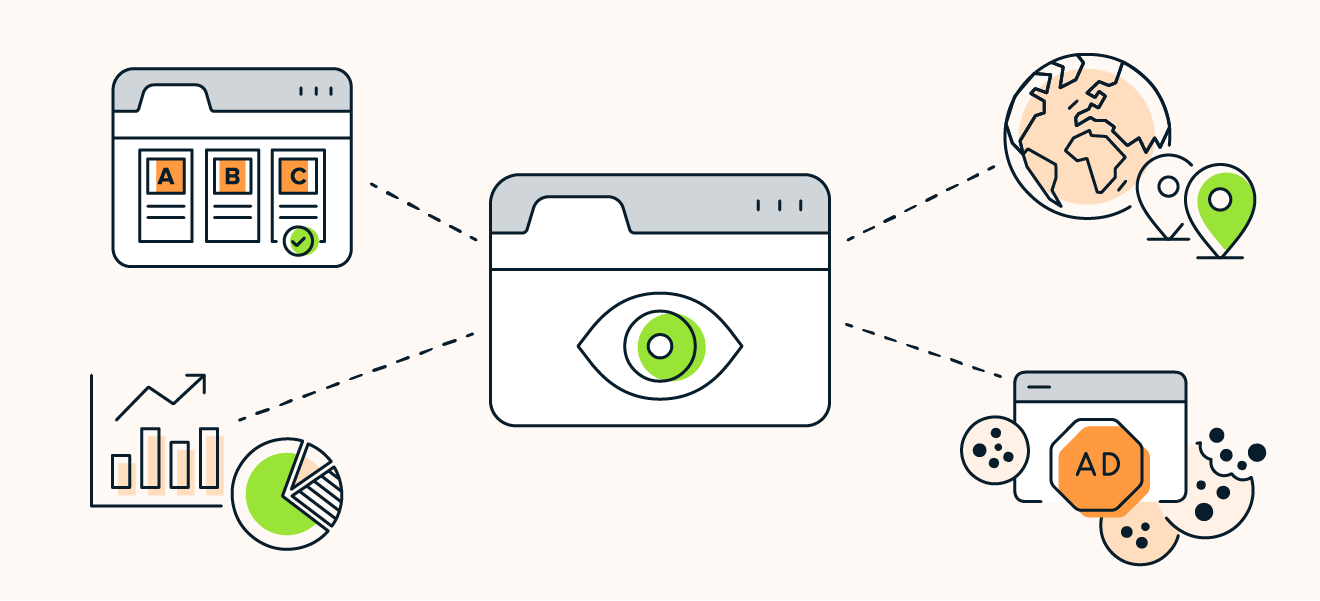 Web tracking is ubiquitous in the most popular browsers.
Web tracking is ubiquitous in the most popular browsers.
All of the browsers on our list include an incognito (or private) browsing mode. But private browsing isn’t the same as anonymous browsing.
Private browsing keeps your browsing history and details off the device you’re using, but it doesn’t control who or what collects your data on the other end. When browsing privately, your IP address and activity can still be tracked by third-party websites.
Private browsing may keep you a bit more secure, but going incognito doesn’t prevent you from downloading malware or offer you any extra security when making online payments.
Anonymous browsing is more secure, because it obscures your personal details and activity from anyone trying to track you online. Identifying information such as your IP address is anonymized, making it much harder for third-party websites to track you.
If you don’t want to be tracked, anonymous browsing is the way to go. While most browsers can’t keep you completely anonymous, tools such as a proxy server, Tor, or a VPN can help anonymize your online activity.
A VPN hides your IP address and encrypts your connection so that personal information, such as your location and browsing activity, remains hidden. VPNs also protect you when you’re using public Wi-Fi.
Most web browsers have options to modify privacy settings to prevent tracking and make your browsing more secure. But all these manual adjustments are cumbersome to manage. A secure, truly private browser will automate these processes, so you have more time for what you really need to do online.
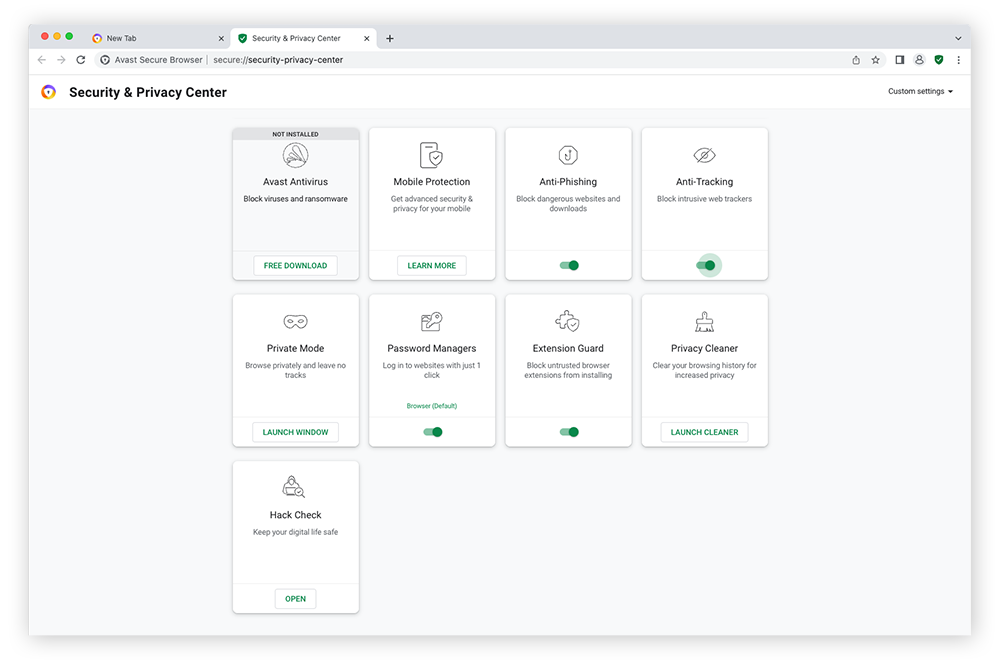
Avast Secure Browser features a built-in privacy and security suite, complete with ad blockers, anti-tracking tools, and automatic HTTPS encryption — so there’s no need to set it all up yourself. And with loading speeds to rival leading browsers, you don’t have to sacrifice speed and convenience for added security. Switch to Avast Secure Browser and start enjoying the safest, most secure web browser right now.
Download free Avast Secure Browser for Windows to get unmatched security and privacy when browsing the web.
Install free Avast Secure Browser for Android to get unmatched security and privacy when browsing the web.
Install free Avast Secure Browser for iPhone and iPad to get unmatched security and privacy when browsing the web.
Download free Avast Secure Browser for Mac to get unmatched security and privacy when browsing the web.
Get smooth and private web browsing with Avast Secure Browser for iPhone and iPad
Get smooth and private web browsing with Avast Secure Browser for Android